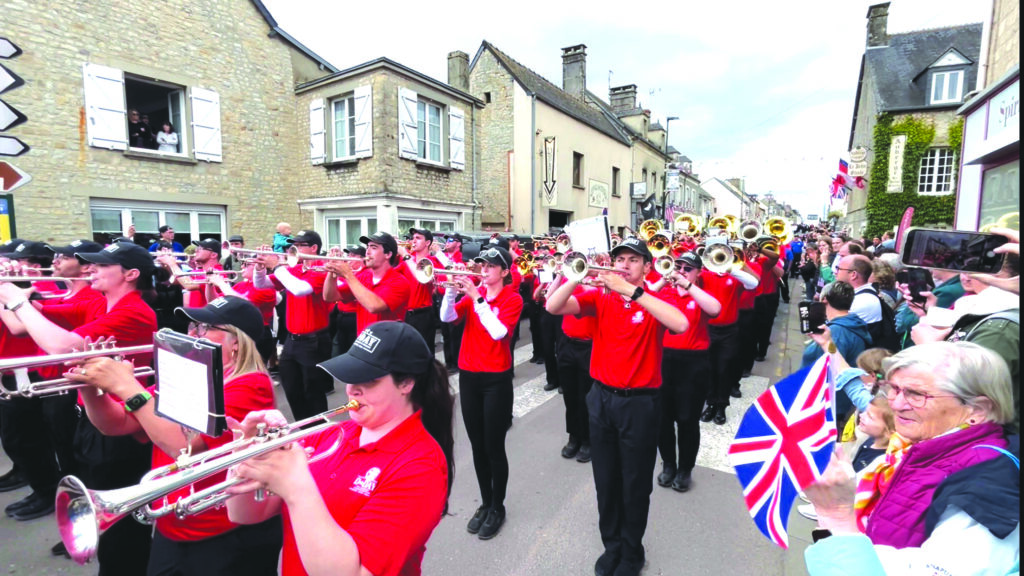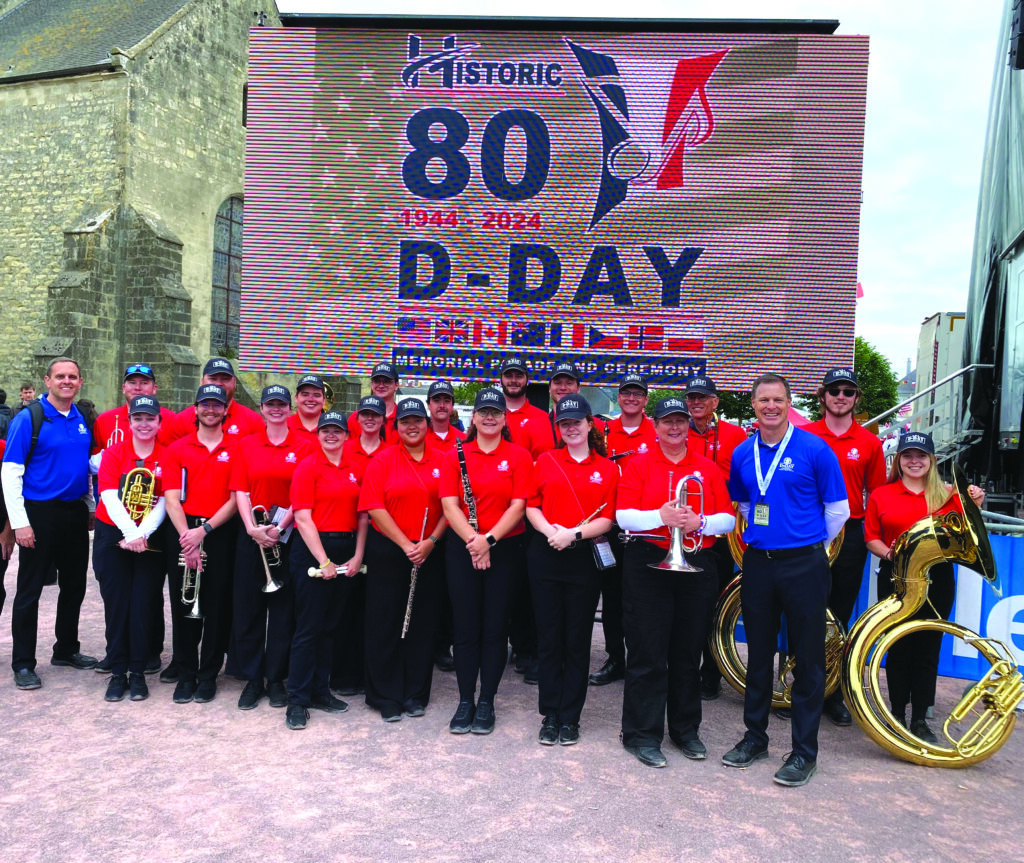
BY ANN CIPPERLY
FOR THE OBSERVER
AUBURN — Using his profession and talents to honor veterans, Dr. Corey Spurlin, director of the Auburn University Marching Band, conducted the Collegiate Mass Band for the 80th Anniversary Celebration of D-Day in Normandy, France.
The Collegiate Mass Band was comprised of 161 current collegiate marching band students and band alumni from across the United States.
Twelve current Auburn band students and eight band alumni also participated in the Collegiate Mass Band for the milestone anniversary. Craig Aarhus, who was drum major at Auburn years ago and now serves as associated director of bands at Mississippi State University, was one of the assistant directors on the trip.
Spurlin was selected over two years ago to organize the band by Historic Programs, a non-profit organization that provides musical entertainment and speakers for D-Day recognitions in France, as well as Pearl Harbor in Hawaii every year.
In his first few months as the conductor of the Mass Band, Dr. Spurlin assembled a staff. Once he had the staff, branding, a logo for the group and website in place, recruiting actively began for the band members across the country. This included numerous emails to organizations for college band students, posts on social media and speaking at different conferences for about a year and a half.
“Many of the soldiers who lost their lives or survived the D-Day landings were the age of our current college students,” said Spurlin. “Part of our mission was to help educate our college students about the sacrifices and heroism of those in the D-Day landings, which was the reason we targeted that age group.”
After the band was assembled, Spurlin had the participants play their instruments in videos to assign parts. “Then we determined which music we wanted to play,” he said. “Some of it is used every year. We decided on other selections we would also utilize.”
Members of the Mass Band were sent the music well in advance to practice on their own. The entire group met in Washington D.C. on June 1. Everyone met at the hotel for dinner that evening, and members had a chance to meet for the first time since they were from all over the country. Then the band held a rehearsal after dinner.
“We learned all the music they would play as the Mass Band,” Spurlin said. “We rehearsed most of the next day. Then we divided the band into three smaller groups, which became the red, white and blue bands. They each had a separate number of songs that they learned and would perform. We also rehearsed marching around the large hotel parking lot to practice the parade marching.
“We were able to see some of the WWII memorials and monuments before traveling to France to celebrate everything in Europe.”
Since the Mass Band was so large, it took four different flights to get the members to Paris. The first part of the trip the group stayed in Honfleur, a coastal town, where their hotel was located. From there, they were bused to different locations. The band performed at American cemetery ceremonies and toured Normandy, Brittany and Paris.
The first performance was peaceful music at the Brittany American Cemetery in St. James. Afterwards, they toured Mont St. Michel, a picturesque island. They also toured Omaha Beach.
The Mass Band was scheduled to perform at the American cemetery in Normandy along with approximately 1,000 other musicians, but President Biden, unexpectedly, altered his itinerary to include a visit to the cemetery and forced the closure of the facility and cancellation of the memorial event. Unfortunately, thousands of spectators and performers were turned away along with veterans of D-Day, now in their 90s and early 100s, who traveled a great distance to be honored.
“It was really a very difficult situation for all of us who were there to celebrate our veterans,” Spurlin said. “It denied many people opportunity to visit the cemetery and do what they came there to do. It was unfortunate, being the 80th anniversary, and so many people were there particularly for that ceremony. It was very difficult for us to manage that cancellation.”
The Mass Band also visited Sainte Mere Eglise, the first town liberated after the beach landings. The band performed upbeat, celebratory music in the town square. They marched through the streets in a massive parade that was an amazing experience for the band, remembering the veterans and their sacrifices. Afterward, the group traveled to Paris where they toured sites before flying back home.
Now that Spurlin is back at this office at Auburn University, he looks back on the trip as being ‘surreal.”
“Standing on Omaha Beach,” he said, “I tried to imagine what the soldiers experienced when they landed there and what they had to overcome. Looking up at the cliffs, we could see the guns and bunkers that are still there. As we stared at those, we wondered what we would have done getting off the landing crafts and trying to make it across the beach. Driving through the landscape of the D-Day landing, you try to put yourself in their shoes to experience what they experienced.”
Both of Spurlin’s grandfathers fought in World War II. His paternal grandfather fought in the Pacific on a cruiser.
“I took this opportunity to use my profession and the blessings I received to honor him and everyone else in his generation,” Spurlin said. “My hope is that the D-Day ceremonies will be passed on to future generations, and when those veterans are no longer with us, that they are honored and celebrated for their bravery and sacrifice.”
